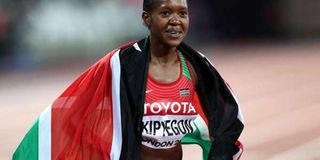Social tags entrench bias against women

Kenya’s Faith Kipyegon celebrates after winning the Women's 1500 metres final during the 16th IAAF World Athletics Championships London 2017. The world has celebrated women on March 8 every year, for the last century, recognising the social, economic cultural and political achievements of women and marks a call to action for accelerating gender parity. PHOTO | ALEXANDER HASSENSTEIN | GETTY IMAGES
What you need to know:
Clichés often accompany these tags. An example is this story that the work or social places are fine and it’s women who need fixing.
All habits that need fixing like an anger management class, an emotional maturity course or self-awareness therapy.
The world has celebrated women on March 8 every year, for the last century.
Like many other women in Kenya, I confront a stereotype or myth at every social or career turn. Let’s have a look at some of the most common tags.
We brand an outspoken woman as too aggressive.
Confident equals proud; and a curious woman is opinionated; analytical is judgmental, while one who remains quiet in meetings either has an attitude, is timid or clueless.
Roll call: Does anybody want an aggressive, proud, opinionated leader? I guess not.
But we unconsciously give these statements a positive spin when applying them to men.
An outspoken man is assertive, while a confident one is a natural leader; curious is visionary, analytical is truly brilliant and a man who keeps quiet in meetings is reflective and wise.
DISCRIMINATION
So, just like that, our choice of adjective diminishes women and elevates men.
These tags entrench subtle discrimination.
They nullify gains and slow progress in political, social, economic spheres because women make about 46 per cent of the world’s work force, and we can’t ignore that.
Clichés often accompany these tags. An example is this story that the work or social places are fine and it’s women who need fixing.
Casually simple, yet detrimental. Because to qualify such a cliché we throw around statements like, “angry woman” or “too emotional” or “that time of the month”.
THERAPY
All habits that need fixing like an anger management class, an emotional maturity course or self-awareness therapy.
And who really wants an angry, emotional boss whose decisions are dictated by hormones? Too weary to fight, in a game where the odds are stacked against them, women wisely opt out, and this is interpreted to mean that they are less ambitious than men, have lower career goals; that they don’t want top roles in companies. Myths.
It’s the world that needs to fix its attitude towards women. Academic studies and countless anecdotes show that being shut down, talked over or penalised for speaking out is nearly a universal experience for women, yet, speaking is a game of power.
LEADERSHIP
That while companies with at least 30 per cent of women leaders see a six per cent increase of profit, having women in leadership is an exception.
World Economic Forum (WEF) Report 2017 indicates that gender parity is at least 112 years away.
A quick calculation using a gender parity calculator shows it will take another 203 years for a 35-year-old woman living in to enjoy gender parity.
Bloomberg research established it will take another 118 years for women to earn the same as men for doing the same job.
These numbers are discouraging, why then should we keep pressing for progress as the 2018 Women’s day theme, urges us to do? Because we can take individual responsibility to influence our spheres, little by little.
CELEBRATE WOMEN
The world has celebrated women on March 8 every year, for the last century.
The day recognises the social, economic cultural and political achievements of women and marks a call to action for accelerating gender parity.
While taking to the streets and boardroom talks has borne some fruits, it’s only a change of tact at personal, corporate, and social level, that will result to great gains in our lifetime.
Socially, parents and teachers should dismantle harmful stereotypes and narratives about gender roles; most of which take root at early development stage.
Let’s pragmatically live the old Swahili saying, Mwana ni mwana awe wa kiume au wa kike; respecting every child for unique skills and capabilities not because of their gender. Sulking and complaining are not options.
Ms Mbiruru is a development communication specialist based in Nairobi. [email protected]




